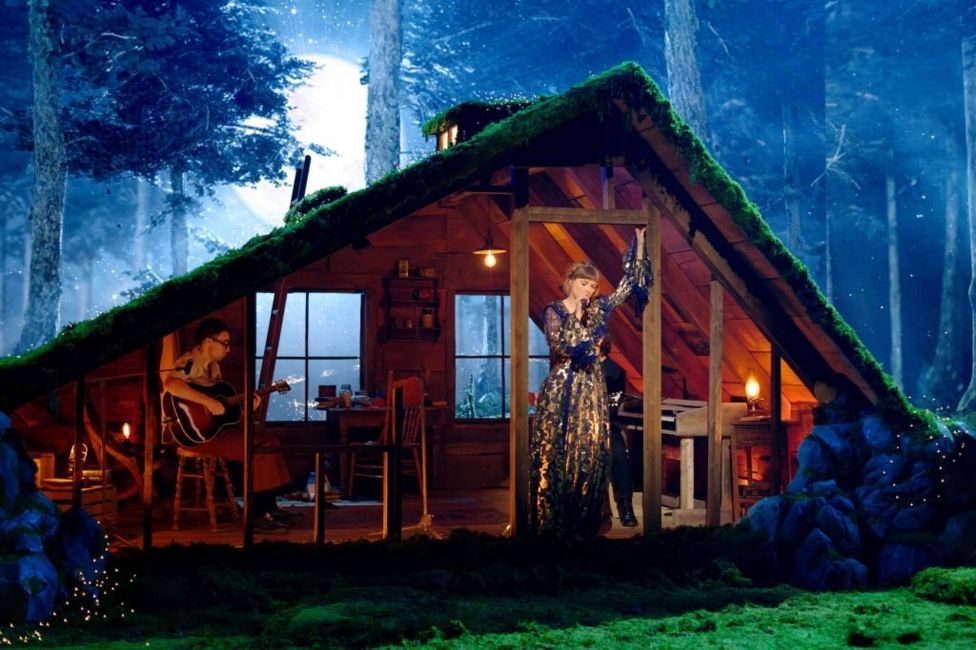Ahead of this year’s Grammys, voters faced a choice between records that engaged with the outside world and ones that retreated from real life.

Taylor Swift at the 2021 Grammys: Stuck indoors like the rest of us
Both approaches were valid. Protest songs like Beyoncé’s Black Parade and H.E.R’s I Can’t Breathe felt as necessary to surviving 2020 as the escapism of Taylor Swift’s quarantine album Folklore or Dua Lipa’s disco opus Future Nostalgia.
In the end, the Grammys gave both equal weight. Swift won album of the year; H.E.R. won record of the year. Dua Lipa won best pop album; Beyoncé won best R&B performance.
The dynamic continued throughout the show, with a series of performances that emphasised how music had, in the words of host Trevor Noah, “touched our lives and saved our souls over this unprecedented year”.
A new feel
And so we saw Cardi B and Megan Thee Stallion performing a censored-but-somehow-still-raunchy version of WAP just before Lil Baby delivered his searing Black Lives Matter anthem The Bigger Picture.
One of the night’s most powerful moments, The Bigger Picture opened with a dramatic re-enactment of Rayshard Brooks’ shooting by Atlanta Police officers last June, and incorporated an impassioned speech from US activist Tamika Mallory.
“President Biden, we demand justice, equity, policy and everything else that freedom encompasses,” she declared. “And to accomplish this, we don’t need allies. We need accomplices.”
It was one of the few big set-pieces on a night that ditched the Grammys’ preoccupation with razzmatazz, choreography and vocal histrionics, and tried something new – musicians playing their songs.
And guess what? It worked.
This was the most compelling and watchable Grammys in years. All the awkward pauses and bum notes that usually plague the ceremony were gone. Instead, we got to see Harry Styles walk through an incredibly relaxed rendition of Watermelon Sugar, and Danielle Haim thrash the living daylights out of her drums on a spirited version of The Steps.
Of course, the producers were forced into this set-up. Pandemic restrictions meant they couldn’t have thousands of dancers or those trademark “Grammy moments” where 25 people sing an inexplicable tribute to The Kids From Fame (this actually happened last year).
Instead, bands were arranged in a circle of stages inside LA’s Convention Center, watching each other play at a safe distance. Every 45 minutes or so, new artists were shuffled in, from Lionel Richie to Miranda Lambert to Doja Cat.
It made the show feel intimate and fresh – something it has needed for a long time.
A lot of the credit goes to Ben Winston, who took over from long-time show-runner Ken Ehrlich last year. The British producer, who memorably delivered the “Adele moment” at the 2011 Brits, said his ambition was to make the show resemble an “Abbey Road studio session” inspired by the TV programmes he watched as a child, including TFI Friday and Later… With Jools Holland.
Hopefully he can hold his nerve and bring the same sense of spontaneity and relevance to next year’s show, even if it goes back to a more regular format.
Venues highlighted
Winston also made sure the ceremony addressed the hardships the music industry has faced over the past year. Some of the awards were presented by employees of music venues that have been left empty by the pandemic. All of them had the same message.
“When the doors are finally able to open again, it’ll be like, ‘OK, I can breathe again’,” said Rachelle Erratchu, of LA’s legendary Troubador club.
An equally poignant moment was the Grammys debut of Mickey Guyton – the only black female country singer signed to a major label – singing her song Black Like Me.
“It’s a hard life on easy street / Just white painted picket fences far as you can see / If you think we live in the land of the free / You should try to be black like me.”
Her quietly defiant song of resistance felt especially relevant at a time when the country music industry is struggling to address its problems with race and bias.
Just last month, best-selling country singer Morgan Wallace was suspended by his record label after a video of him using a racial slur emerged online – but his album remains at the top of the US charts. Guyton is one of the few to publicly rebuke him, tweeting: “The hate runs deep.”

